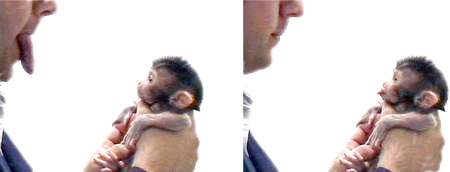模仿
模仿(英語:imitate;日语:まねる、模倣する;韓語:동사),或稱仿效、模效、模傚、摹仿、摹傚等,是一種動物個體有意識的觀察並複製外界行為的現象。[1] 模仿導致個體之間和代際文化及傳統的形成,此過程相對不涉及基因遺傳。[2] 潛意識所致的模仿被稱為鏡映。[1]

模仿使個體能夠藉觀察周遭快速有效地學習。但是,在人類之中,有些如患有自閉症類群障礙的個體可能缺乏此類能力;此類情況可透過應用行為分析等方式改善。[3]
參見
编辑參考資料
编辑- ^ 1.0 1.1 Chartrand, T.; Bargh, J. The Chameleon Effect: The Perception-Behavior Link and Social Interaction (PDF). Journal of Personality and Social Psychology (New York University). 1999, 76 (6): 893–910 [2014-09-28]. PMID 10402679. S2CID 11818459. doi:10.1037/0022-3514.76.6.893.
- ^ Hopper, Lydia M. Deferred imitation in children and apes. Psychologist. 2010, 23 (4): 294–7 [March 8, 2021]. (原始内容存档于August 3, 2014).
- ^ Expert Columns: What is Imitation and Why is it Important?. www.mayinstitute.org. [2024-10-21].
| 这是一篇與动物相關的小作品。您可以通过编辑或修订扩充其内容。 |